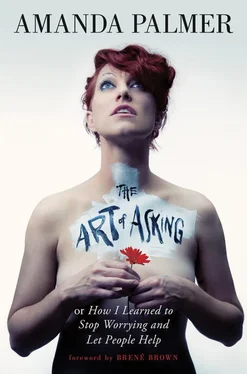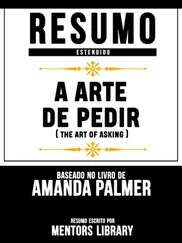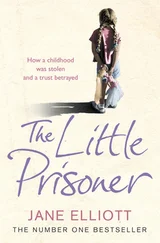• • •
I had a manager who couldn’t understand why I was upset that his assistant had booked me a hotel with no wireless during a three-day press trip in London.
I NEED A NEW HOTEL WITH INTERNET , I tried to explain over the phone. I NEED THE INTERNET TO LIVE .
You’re on a three-day press trip doing ten hours of interviews a day. What do you need the Internet for?
Another manager didn’t understand why I thought it was so important that she read my Twitter feed to understand what was actually happening. To see what the fanbase was feeling, saying, sharing, complaining about, and how they were responding to the shows.
It was a massive leap of faith for these people to believe that “just connecting with people,” in an authentic, non-promotional, non-monetary way, is so valuable .
But it is. It’s in valuable.
Those managers seemed really reluctant to believe that if you just trusted and listened to, talked to, and connected with the fanbase, the money and the profits would come—when the time came.
Managers kept telling me to stop twittering and get back to work.
I broke up with a lot of managers.
They didn’t understand. That was the work.
• • •
As we barreled along, crowdsourcing food and passing the hat, I continued crashing with fans, and when I left the Dolls and brought along my merry, motley crew of Australian performance artists, things became even more challenging: there were seven of us. We offered our typical exchange of tickets, merch, and gratitude—and with Steven at the helm, we sorted through hundreds of email offers of crash pads. My traditional road crew—sound person, light person, tour manager, and merchandise vendor—were all on full salary, and I paid for their hotels. But nobody bitched about a double standard. The road crew weren’t taking a job with me for an exercise in humanity-trusting. They were taking a job with me to tour in a bus, get their off days in hotels, get paid, and do their jobs. I could afford to put them up. The rest of the performers and I tried our luck on the couches of the universe.
One summer in Melbourne, where we did a run of shows at a venue called The Famous Spiegeltent, we all slept in a single room, on a compilation of mattresses and futons loaned by various people. It was like a weeklong slumber party, or like a bunch of artistic bears hibernating in a very hot cave, all piled up next to each other with no particular boundaries. Mostly, we were staying in places like the ones we lived in ourselves: share houses full of grad students; giant messy lofts inhabited by musicians and painters. But sometimes we stayed in the more grown-up homes of working professionals who were happy to leave us behind with the Wi-Fi password, instructions for the espresso machine, and the keys, because they had to split for work early in the morning. It was a testament to the generosity of my fans that on several occasions, our hosts couldn’t even come to the shows, but still welcomed us into their homes.
Couchsurfing is about more than saving on hotel costs. It’s a gift exchange between the surfer and the host that offers an intimate gaze into somebody’s home, and the feeling of being held and comforted by their personal space. It’s also a reminder that we’re floating along due to a strong bond of trust, just like when I surf the crowd at a show, safely suspended on a sea of ever-changing hands. It can feel almost holy, looking at somebody else’s broken shower nozzle, smelling the smells of a real kitchen, feeling the fray of a real blanket and hearing the crackle of an old steam radiator.
Sometimes we’d have the energy to burn the midnight oil with our hosts over tour stories and wine, but usually we were all so exhausted from the show itself that we were more likely to collapse as soon as we were assigned our sleeping spots. Mornings were often more social, though we usually had a strict deadline to get out the door to the next city. Off days were even more fun—we could hang out with our hosts and spend more human time petting cats and learning about who these people truly were.
Staying in your own home can be corrosive and stifling, especially for creative work. The surroundings can smother you with the baggage of your past and the History of You. Staying in a hotel can be a blissful blank slate. There’s no baggage, just an empty space onto which you can project anything. But staying in a stranger’s home can inspire like nothing else. You get to immerse yourself in the baggage of someone else’s past, and regard someone else’s mess of unsorted books piled up in the corner of the living room.
It’s not always all rainbows and unicorn bedsheets, though. Couches come with people who own couches. Sometimes people just aren’t good at the dance, and can’t tell when the performers need to stop socializing. In those awkward situations, you smile wearily, edge politely towards your toothbrush, and make the best of it, hoping the hint will be taken. I will hug you. I will love you. I will genuinely admire your kitchen cow collection. But when it is time, please let me go the fuck to sleep.
There’s an inherent, unspoken trust that happens when you walk through the door of your host’s home. Everybody implicitly trusts everybody else not to steal anything. We leave our phones, our wallets, our laptops, our journals, and our instruments lying scattered around our various mini-couchsurfing campsites. To my knowledge, I’ve never had anything go missing.
I’m often asked: How can you trust people so much?
Because that’s the only way it works.
When you accept somebody’s offer for help, whether it’s in the form of food, crash space, money, or love, you have to trust the help offered. You can’t accept things halfway and walk through the door with your guard up.
When you openly, radically trust people, they not only take care of you, they become your allies, your family.
Sometimes people will prove themselves untrustworthy.
When that happens, the correct response is not:
Fuck! I knew I couldn’t trust anybody!
The correct response is:
Some people just suck .
Moving right along.
• • •
Shortly after my tour with The Danger Ensemble ended, I went on a solo tour of the American South with a sister duo called Vermillion Lies opening up for me, plus a merch girl and a sound guy, which made us a small, cramped van of five. We were staying with fans wherever people had volunteered, and in cheap motels when they hadn’t.
The morning of our Miami show, we navigated our van through a rough-looking neighborhood towards the house where we were staying, eager to unload our stuff, say hello to our hosts, and take a nap after the long drive from Texas. As we approached the address, we exchanged worried glances as we passed desolate, boarded-up houses, cars broken down on lawns, and the subtle signals that crystal meth was probably easy to score. Arriving at the house, we were welcomed by Jacky, our eighteen-year-old host, into a small but warm and inviting home.
Jacky’s family were undocumented immigrants from Honduras, her mother barely spoke English, and they made an absolute fuss over us. Jacky, who was beside herself that we were staying, brought out the medical-lab jackets that she and her friends had bedazzled and paint-splattered to wear to the show the next night, before showing us to our beds. There were only three beds in the house, but I had already met Jacky, her mother, and her brother.
I’m confused , I said.
No confusion! In our family, the guests always sleep in the beds. We’re all sleeping outside and on the couches… We’ve been planning this for weeks. You should have seen our shopping adventure for vegan food for you! She looked so happy. We’re going to give you tortilla lessons at breakfast tomorrow!
Читать дальше












